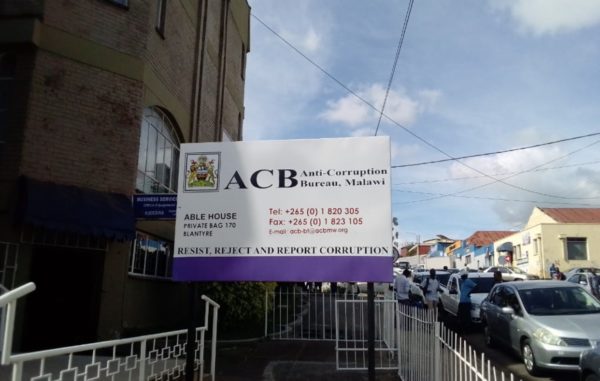Ex-ACB bosses defend bureau
Two former Anti-Corruption Bureau (ACB) directors-general have defended the performance of the graft-busting body during the past eight years when it secured 47 convictions out of 134 cases it prosecuted.
The 47 convictions, according to ACB 2021 annual report submitted to Parliament, are part of the 495 cases the bureau was prosecuting between 2013 and 2020.

Out of the 134 completed cases, 13 were awaiting judgement, 19 were acquittals and three were withdrawn.
While describing the number of convictions as low for a country deemed to have a bad reputation on corruption, a former ACB director general (DG), who asked for anonymity, added that the bureau’s performance largely depends on the support it is given.
He said: “The small number [of convictions and completed cases] is a disgrace to the fight against corruption, but the bureau’s performance, among other factors, also depends on how the courts are prioritising corruption cases.”
The former DG also said low funding contributed to the small number of cases the bureau completed each year.
Another former ACB boss, who also spoke on condition of anonymity, faulted the approach to the fight against corruption in the country, saying it targets prosecution at the expense of prevention which is equally important.
He observed that prevention and civic education measures, which he described as key to long-term remedy of corruption, are not given the necessary attention or recognised as essential to the fight against corruption.
Instead, he said, the public just wants to see an official or a Cabinet minister being arrested.
Said the official: “The approach now is to finish off enemies. Nobody is interested in prevention or fixing a broken system or mindset change through civic education. All that the public wants to hear is how many people have been arrested or whether a certain Cabinet minister has been arrested.
“This approach is faulty and the bureau is being heavily and unfairly treated. There is need to prioritise prevention and civic education components if the fight against corruption is to be successfully won.”
Centre for Social Accountability and Transparency (Csat) Executive director Willy Kambwandira said there is need to do a post-mortem to find exactly what delays prosecution and conclusion of corruption cases.
Said Kambwandira: “We are greatly worried with the increased number of corruption cases that are pending judgement as per ACB’s report. If not urgently addressed, this has potential to frustrate efforts by the investigating and prosecuting agencies, especially when they see that there is no conclusion of the cases.
“Again, this might also erode public trust and confidence in these institutions, and may raise speculation that there are some people that are being protected from facing the law. We are, therefore, pleading with ACB and the Judiciary to fast-track delivery of justice on the 13 cases that are pending judgement.”
A 2021 study on fighting corruption in Malawi found that delayed funding to law enforcement agencies such as the ACB and influence from politicians are among contributing factors to the country’s poor showing in the fight against corruption.
Other factors include weak and incoherent legal framework, according to the study.
The findings are contained in two-country case studies of the project—‘Fighting High-Level Corruption in Africa: Learning from Effective Law Enforcement’—released in June last year by Britain’s Foreign Commonwealth and Development Office (FCDO). Funded by the Global Integrity Anti-Corruption Evidence Programme, the study covered the period between 2019 and 2021.
Reads the report in part: “Law enforcement agencies are generally as underfunded and overwhelmed as all government departments. Experienced [personnel] are in low supply and daunted. Investigators and prosecutors even at the same agency do not work together to deal with high-level corruption cases.”
Funding to ACB has in the recent years been fluctuating as in 2017/18 financial year, the bureau’s funding dropped to K938 million from K2.4 billion it was allocated in 2016/17. In the 2019/20 fiscal year, Treasury allocated it K3.7 billion while in 2020/21 financial year, ACB was allocated K3.9 billion against its proposed budget of K4.6 billion.
Reacting to the funding cut for the 2020/21 financial year in an earlier interview, ACB deputy director Elia Bodole said it would be a challenge with such inadequate funding for the graft-busting agency to effectively carry out its functions.
In 2020, former ACB director general Reyneck Matemba decried poor funding to the bureau at a time when they were investigating the judge bribery case. He appealed to government to have 30 percent of the bureau’s monthly allocation disbursed in advance for speedy handling of cases. But, according to the bureau’s spokesperson Egrita Ndala, the proposal did not materialise because the Accountant General said its implementation would be difficult.
During the just passed 2022/23 budget, ACB has been allocated K6.3 billion against its proposed budget of K8 billion.
In an interview yesterday Ndala did not comment on underfunding and how this affects its work, but said the bureau is aware that government funds the organisation and other MDAs from funds that are collected domestically.
“It will, therefore, ensure that the resources that it will be funded are effectively used in delivering its services to Malawians,” she said.
The FCDO study also observes that the legal framework is characterised by a patchwork of statutes, resulting in discrepancies, overlaps, gaps and lack of clarity.





